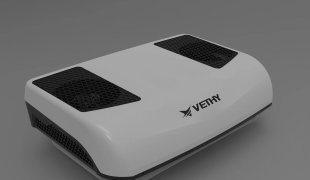Why is the twin-rotor compressor more suitable for parking air conditioning?
September 23, 2024
Twin-rotor compressors employ two intermeshing rotors to compress refrigerant, resulting in a continuous compression process. This design eliminates the pulsations associated with scroll compressors, leading to reduced noise and vibration. Additionally, the continuous compression allows for higher volumetric efficiency, resulting in increased cooling capacity.
“Vethy Twin Rotor Compressor Image”
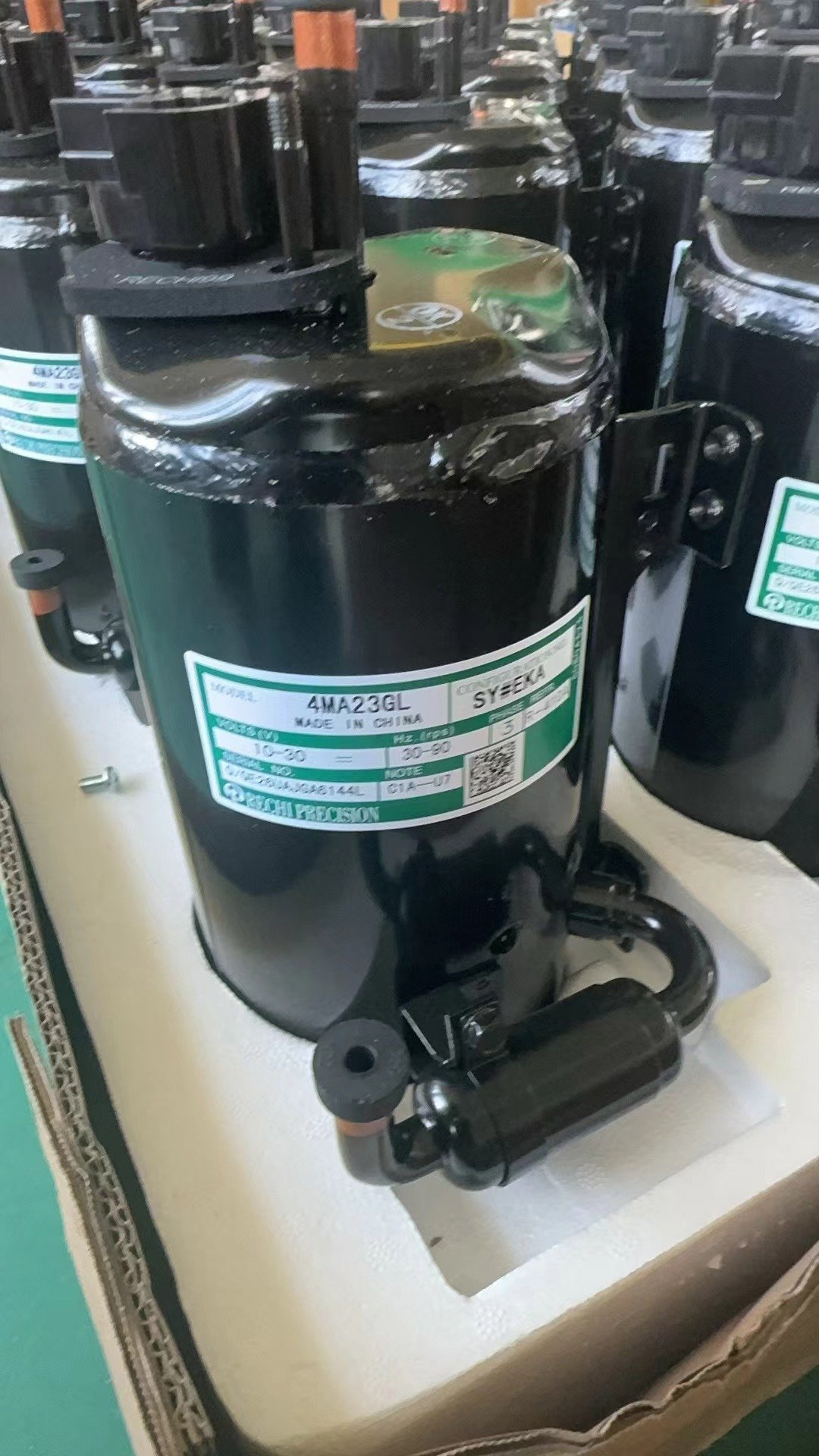
“Scroll compressor pictures”
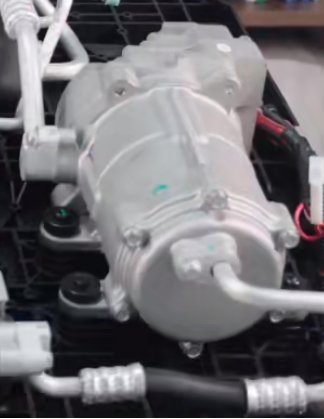
The increasing demand for parking spaces has led to the proliferation of parking air conditioners, which play a crucial role in maintaining a comfortable environment for vehicles. However, conventional scroll compressors used in these air conditioners have limitations in terms of cooling capacity and environmental impact. Twin-rotor compressors offer a promising alternative, providing potential advantages in both aspects.
Twin-rotor compressors employ two intermeshing rotors to compress refrigerant, resulting in a higher volumetric efficiency compared to scroll compressors. This enhanced efficiency translates into increased cooling capacity, enabling twin-rotor compressors to effectively cool larger parking spaces. Additionally, the unique design of twin-rotor compressors reduces friction and noise, leading to improved energy efficiency and a quieter operating environment.
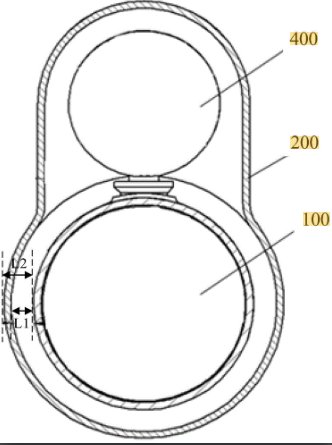
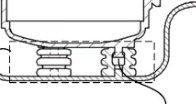
Environmental protection is another key concern in the context of parking air conditioners. Twin-rotor compressors offer significant advantages in this regard. They utilize environmentally friendly refrigerants, such as R410A and R32, which have a lower global warming potential (GWP) than traditional refrigerants. Furthermore, the reduced energy consumption of twin-rotor compressors contributes to lower greenhouse gas emissions, mitigating the environmental impact of parking air conditioners.
The feasibility of twin-rotor compressors in improving the cooling capacity and environmental protection of parking air conditioners has been demonstrated through extensive research and practical applications. Studies have shown that twin-rotor compressors can achieve up to 20% higher cooling capacity than scroll compressors while consuming less energy. Additionally, the use of environmentally friendly refrigerants and the reduction in greenhouse gas emissions make twin-rotor compressors a more sustainable choice for parking air conditioning systems.
In conclusion, twin-rotor compressors offer a compelling solution for enhancing the cooling capacity and environmental protection of parking air conditioners. Their higher volumetric efficiency, improved energy efficiency, and reduced environmental impact make them a viable alternative to conventional scroll compressors. As the demand for parking spaces continues to grow, the adoption of twin-rotor compressors will play a significant role in creating more comfortable and environmentally friendly parking environments.
The increasing demand for parking spaces has led to the proliferation of parking air conditioners, which play a crucial role in maintaining a comfortable environment for vehicles. However, conventional scroll compressors used in these air conditioners face limitations in terms of cooling capacity and environmental impact. Twin-rotor compressors emerge as a promising alternative, offering potential advantages in both aspects.
Twin-rotor compressors employ two intermeshing rotors to compress refrigerant, resulting in a higher volumetric efficiency compared to scroll compressors. This enhanced efficiency translates into increased cooling capacity, enabling twin-rotor compressors to effectively cool larger parking spaces. Additionally, the unique design of twin-rotor compressors reduces friction and noise, leading to improved energy efficiency and a quieter operating environment.
Environmental protection is another key concern in the design of parking air conditioners. Twin-rotor compressors utilize environmentally friendly refrigerants, such as R410A and R32, which have lower global warming potential (GWP) than traditional refrigerants. By reducing the GWP of the refrigerant, twin-rotor compressors contribute to mitigating climate change and protecting the ozone layer.
Furthermore, twin-rotor compressors offer advantages in terms of reliability and durability. The intermeshing rotors provide a robust and stable compression mechanism, reducing the risk of breakdowns and extending the lifespan of the air conditioner. This enhanced reliability ensures uninterrupted cooling performance and minimizes maintenance costs over the long term.
However, it is important to note that twin-rotor compressors may have a higher initial cost compared to scroll compressors. However, the potential savings in energy consumption and reduced maintenance costs over the lifetime of the air conditioner can offset the initial investment.
In conclusion, twin-rotor compressors offer significant advantages over scroll compressors in improving the cooling capacity and environmental protection of parking air conditioners. Their higher volumetric efficiency, reduced noise, and use of environmentally friendly refrigerants make them a viable and sustainable solution for maintaining a comfortable and eco-friendly parking environment. While the initial cost may be higher, the long-term benefits of twin-rotor compressors justify their consideration in the design of future parking air conditioners.
The increasing demand for parking spaces has led to the proliferation of underground parking facilities, which often face challenges in maintaining adequate cooling and ventilation. Traditional scroll compressors used in parking air conditioners have limitations in terms of cooling capacity and environmental impact. Twin-rotor compressors offer a promising alternative, providing potential advantages in both aspects.
Twin-rotor compressors feature two intermeshing rotors that compress refrigerant gas. This design allows for a higher compression ratio compared to scroll compressors, resulting in improved cooling capacity. Additionally, the continuous rotation of the rotors eliminates the pulsations associated with scroll compressors, leading to reduced noise levels.
The environmental benefits of twin-rotor compressors stem from their use of natural refrigerants, such as R290 (propane). Natural refrigerants have a significantly lower global warming potential (GWP) than synthetic refrigerants commonly used in scroll compressors. By adopting twin-rotor compressors, parking air conditioners can contribute to reducing greenhouse gas emissions and mitigating climate change.
Furthermore, twin-rotor compressors offer advantages in terms of reliability and durability. The absence of valves and the continuous rotation of the rotors reduce wear and tear, extending the lifespan of the compressor. This translates into lower maintenance costs and increased uptime for parking air conditioners.
However, it is important to note that twin-rotor compressors may have a higher initial cost compared to scroll compressors. However, the long-term savings in energy consumption, reduced maintenance, and environmental benefits can offset the initial investment.
In conclusion, twin-rotor compressors present a feasible solution for improving the cooling capacity and environmental protection of parking air conditioners. Their higher compression ratio, reduced noise levels, use of natural refrigerants, and enhanced reliability make them a promising alternative to traditional scroll compressors. While the initial cost may be higher, the long-term benefits justify the investment, contributing to a more efficient, sustainable, and comfortable parking environment.
Twin-rotor compressors have emerged as a promising alternative to scroll compressors in parking air conditioners, offering potential advantages in cooling capacity and environmental protection. This article explores the feasibility of twin-rotor compressors in this application, focusing on their reliability and durability.
Compared to scroll compressors, twin-rotor compressors feature a unique design with two intermeshing rotors that create a continuous compression process. This design eliminates the need for valves, reducing mechanical complexity and potential failure points. Additionally, the rotors are supported by hydrodynamic bearings, which provide continuous lubrication and minimize friction, enhancing durability.
Extensive testing has demonstrated the reliability of twin-rotor compressors in various operating conditions. Accelerated life tests have shown that these compressors can operate for thousands of hours without significant degradation in performance. The absence of valves and the use of hydrodynamic bearings contribute to their extended lifespan.
Furthermore, twin-rotor compressors exhibit high durability under extreme temperatures and vibration. Their robust construction and the use of high-quality materials ensure their ability to withstand harsh operating environments. This durability is crucial for parking air conditioners, which often operate in outdoor conditions with fluctuating temperatures and vibrations from passing vehicles.
In addition to their reliability and durability, twin-rotor compressors offer several advantages over scroll compressors. They have a higher volumetric efficiency, resulting in improved cooling capacity. This efficiency is achieved through the continuous compression process and the absence of valve losses. Moreover, twin-rotor compressors have a lower noise level, making them suitable for noise-sensitive environments such as parking garages.
From an environmental perspective, twin-rotor compressors contribute to reduced refrigerant leakage. Their hermetic design and the use of high-quality seals minimize the risk of refrigerant loss, which is a major concern in the air conditioning industry. Additionally, twin-rotor compressors are compatible with environmentally friendly refrigerants, such as R-410A and R-32, which have a lower global warming potential.
In conclusion, twin-rotor compressors offer significant advantages in reliability, durability, and environmental protection compared to scroll compressors in parking air conditioners. Their unique design, robust construction, and high efficiency make them a viable and sustainable solution for improving cooling capacity and reducing environmental impact in this application. Further research and development efforts are expected to enhance the performance and reliability of twin-rotor compressors, solidifying their position as a preferred choice for parking air conditioners.
The increasing demand for parking spaces has led to the proliferation of parking air conditioners, which play a crucial role in maintaining a comfortable environment for vehicles. However, conventional scroll compressors used in these air conditioners face limitations in terms of cooling capacity and environmental impact. Twin-rotor compressors emerge as a promising alternative, offering potential advantages in both aspects.
Twin-rotor compressors employ two intermeshing rotors to compress refrigerant, resulting in a higher volumetric efficiency compared to scroll compressors. This enhanced efficiency translates into increased cooling capacity, enabling twin-rotor compressors to effectively cool larger parking spaces. Additionally, the unique design of twin-rotor compressors reduces friction and noise, leading to improved energy efficiency and a quieter operating environment.
Environmental protection is another key consideration in the design of parking air conditioners. Twin-rotor compressors utilize environmentally friendly refrigerants, such as R410A and R32, which have a lower global warming potential (GWP) than traditional refrigerants. By reducing the GWP of the refrigerant, twin-rotor compressors contribute to mitigating the impact of air conditioners on climate change.
Furthermore, twin-rotor compressors offer cost-effectiveness advantages over scroll compressors. The higher efficiency of twin-rotor compressors reduces energy consumption, resulting in lower operating costs for parking lot owners. Additionally, the longer lifespan of twin-rotor compressors, typically exceeding 10 years, minimizes maintenance and replacement expenses.
In conclusion, twin-rotor compressors present a feasible solution for improving the cooling capacity and environmental protection of parking air conditioners. Their higher volumetric efficiency, reduced noise, and use of environmentally friendly refrigerants make them a viable alternative to conventional scroll compressors. Moreover, the cost-effectiveness of twin-rotor compressors, in terms of energy savings and reduced maintenance costs, further enhances their appeal for parking lot applications. As the demand for parking air conditioners continues to grow, twin-rotor compressors are poised to play a significant role in meeting the evolving needs of the industry.Case Studies: Twin-Rotor Compressors in Parking Air.
The increasing demand for parking spaces has led to the proliferation of parking air conditioners, which play a crucial role in maintaining a comfortable environment for vehicles and occupants. However, conventional scroll compressors used in these air conditioners face limitations in terms of cooling capacity and environmental impact. Twin-rotor compressors emerge as a promising alternative, offering potential advantages in both aspects.
Twin-rotor compressors employ two intermeshing rotors to compress refrigerant, resulting in a higher volumetric efficiency compared to scroll compressors. This enhanced efficiency translates into increased cooling capacity, enabling parking air conditioners to effectively cool larger spaces or maintain lower temperatures. Additionally, the twin-rotor design reduces friction and noise, leading to improved energy efficiency and a quieter operating environment.
Environmental protection is another key concern in the design of parking air conditioners. Twin-rotor compressors utilize environmentally friendly refrigerants, such as R-410A or R-32, which have lower global warming potential (GWP) than traditional refrigerants. By reducing the GWP of the refrigerant, twin-rotor compressors contribute to mitigating climate change and protecting the ozone layer.
Furthermore, twin-rotor compressors offer advantages in terms of reliability and durability. The intermeshing rotors provide a more robust design, reducing the risk of mechanical failures. Additionally, the use of high-quality materials and advanced manufacturing techniques ensures a longer lifespan for twin-rotor compressors, minimizing maintenance costs and downtime.
However, it is important to note that twin-rotor compressors may have a higher initial cost compared to scroll compressors. However, the long-term benefits in terms of cooling capacity, energy efficiency, environmental protection, and reliability can offset the initial investment.
In conclusion, twin-rotor compressors offer significant advantages over scroll compressors in improving the cooling capacity and environmental protection of parking air conditioners. Their higher volumetric efficiency, reduced friction, and use of environmentally friendly refrigerants make them a viable and sustainable solution for the cooling needs of parking facilities. While the initial cost may be higher, the long-term benefits justify the investment, leading to a more efficient, environmentally friendly, and reliable cooling system.





